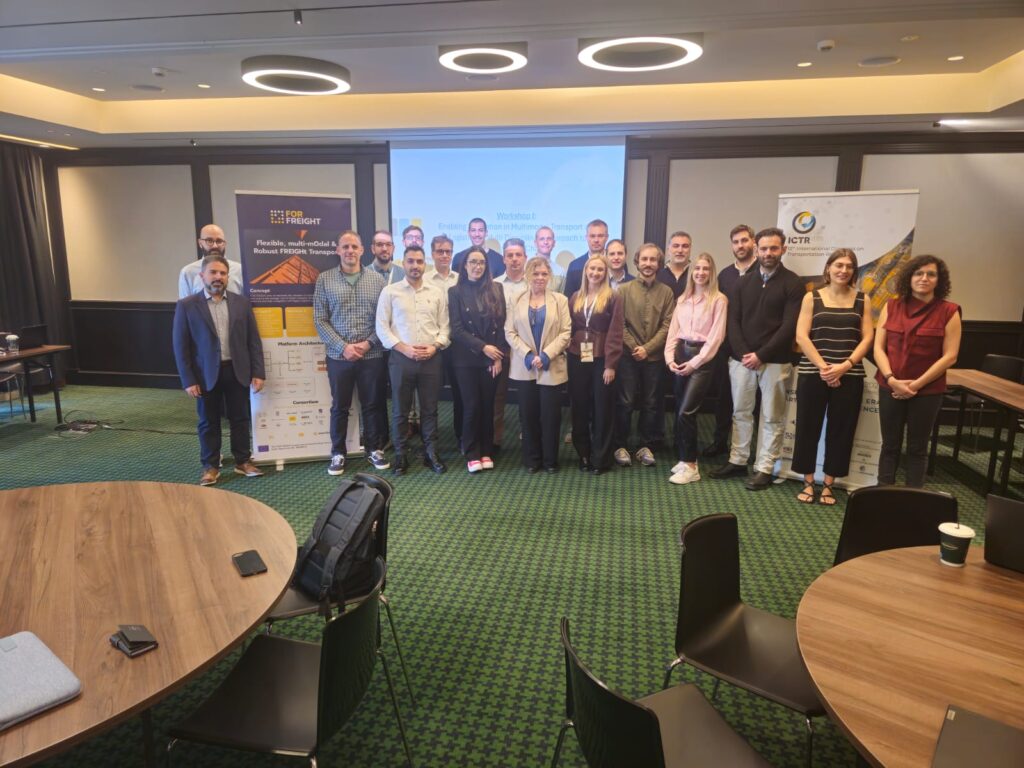News & Events
FOR-FREIGHT Workshop at ICTR 2025: Enabling Innovation in Multimodal Transport and Logistics

On 16 October 2025, the FOR-FREIGHT project successfully organised its workshop titled “Enabling Innovation in Multimodal Transport and Logistics: A Multi-Disciplinary Approach to Ecosystemic Change” as part of the International Conference on Transport Research (ICTR 2025) held in Greece 🇬🇷.
The workshop explored how digitalization, interoperability, and policy frameworks can drive innovation in multimodal freight transport, fostering collaboration between academia, industry, and policymakers toward a more efficient, sustainable, and connected logistics ecosystem.
Workshop Objectives
The session aimed to examine how emerging digital technologies — including Artificial Intelligence (AI), Internet of Things (IoT), and blockchain — can optimise multimodal logistics operations and improve sustainability, resilience, and data-driven decision-making across transport modes.
It also sought to identify challenges and opportunities related to standardization, data interoperability, and collaboration frameworks essential for achieving seamless multimodal operations in Europe.
Workshop Highlights
The event was structured around a combination of keynote presentations, scientific papers, and an expert panel discussion, featuring contributions from leading research institutions, logistics companies, and technology providers involved in FOR-FREIGHT and beyond.
Key topics addressed included:
Standardisation and interoperability in multimodal freight transport
Business model development and policy support for AI-enabled decision systems
Digital transformation and its economic, environmental, and social impacts
Stakeholder engagement and R&I strategies for ecosystem-based innovation
Paper Presentations
A total of eight peer-reviewed scientific papers associated with the FOR-FREIGHT project were presented, covering diverse aspects of digital logistics and multimodal innovation:
Enhancing Multimodal Logistics through Workflow Integration and Sustainability-Focused Optimisation (Case Study: Greece)
Digital Solutions for Efficient and Sustainable Multimodal Freight Transport on the Danube (Case Study: Romania)
AI-Enhanced Multimodal Logistics: Innovative Solutions for Seamless Freight Operations (Case Study: Spain)
Understanding the Benefits of Supply Chain Digital Transformation: A Multi-Step Framework for Operational Evaluation
Advancing Digital Standardisation in Multimodal Logistics: Insights from the FOR-FREIGHT Project
Understanding Vertical and Horizontal Logistics Collaboration: A Review of Barriers and Drivers for Digital Logistics Marketplace Success
Towards Sustainable Transport and Logistics: Leveraging R&I and Stakeholder Engagement for Impact
Innovation Maturity Framework: A Multi-Dimensional Approach for Assessing Readiness in Logistics Solutions
Panel Discussion
The workshop concluded with a panel discussion featuring representatives from:
@CERTH, @WINGS ICT Solutions, @Fundacion Valenciaport, @BEIA Consult, @TIC 4.0, and Galati Port.
Panelists shared their perspectives on:
The role of digitalisation in reshaping collaboration among transport modes and stakeholders
Key interoperability challenges encountered during implementation and how FOR-FREIGHT addressed them
Lessons learned from introducing digital solutions in ports with lower digital readiness
The impact of AI on decision-making and operational efficiency in multimodal logistics
Effective engagement of industry stakeholders to ensure market uptake after project completion
Impact and Next Steps
The workshop successfully fostered dialogue between research and industry, highlighting the critical role of interoperability, data sharing, and standardisation in enabling the digital transition of multimodal freight systems.
The insights gained will contribute to a forthcoming white paper, summarising key findings, challenges, and recommendations from the session. This publication will serve as a reference for policymakers, researchers, and industry actors working toward a more integrated and sustainable logistics landscape in Europe.
The FOR-FREIGHT workshop demonstrated the project’s continued commitment to supporting the EU Green Deal and Digital Transport initiatives, paving the way for efficient, data-driven, and environmentally responsible freight transport solutions.
